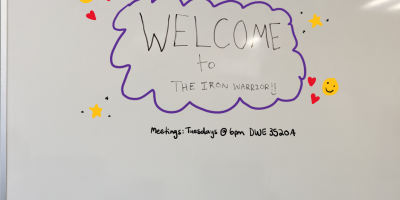Universities fulfill many roles in today’s society. Not only do they educate us, but they also provide opportunities for innovation and research. Waterloo’s website proudly proclaiming “Everything you discover at Waterloo belongs to you,” just underlines how much more happens at a university than students sitting in classrooms.
The University of Waterloo puts a lot of resources and energy into research and innovation. Initiatives such as VeloCity and the David Johnston Research and Technology Park give new companies and ideas the chance to get off the ground. A glance through the Waterloo Engineering 2010 Annual Report highlights some of the research going on in the various departments. Entrepreneurship and research are important – even vital – parts of a university. It is also important to remember the other reason that universities exist.
Universities educate us. They are certainly not the only path out of high school, but they are a popular one. In my very biased opinion as an undergrad, I would be willing to say that teaching could be one of the most important functions that universities fulfill. They provide the world with the engineers, architects, doctors, etc. Only a fraction of these students will go into research. Far more will go into industry. Giving them the knowledge they need to succeed should be considered as important as funding research.
This leads to the question, where should the lines be drawn?
I’m sure most undergrad engineering students have had an amazing lecturer who does no research, or a professor who is a brilliant researcher but has no talent for teaching. It makes me wonder whether our current model is working. It seems, at least to me, that teaching is considered an add-on to research. Don’t get me wrong, I’ve had some amazing profs, but I’ve also had ones that are clearly researchers first and teach as an afterthought.
I’ve heard that professors, at least in my department, are evaluated based on the three categories: research, teaching, and service. Sometimes I wonder if that’s a good thing. Researchers teach, regardless of whether they have any passion or skill for teaching. Just because someone understands a topic does not necessarily mean that they can explain the topic to a classroom full of students. Is forcing them to teach doing anyone any favours? Neither the students nor the professor will benefit from such an experience.
In the June 1st issue of The Iron Warrior, the Point vs. Counterpoint section debated what universities should be teaching us. While the question of theory versus application is important, I would argue that how they teach us as important as what they teach us. A bad professor can destroy a perfectly good course; a good one can make a painful course into something much less onerous.
The problem does not solely reside with the administration and faculty, either. Course critiques are one of the few ways that students can get their opinions and suggestions heard. However, time after time, I hear classmates telling me that they aren’t going to bother. Either that, or they give every prof they ever had a perfect score with no comments. They tell me they think that the course evaluations are useless, so there is no point in wasting their time on it, or they’re convinced that the prof will take revenge on the class for a bad evaluation, even after I’ve assured them that the critiques won’t be seen until after the final marks have been submitted. Can we, the student body, demand better teaching if we can’t even take ten minutes out of our lives to tell the university where there is a problem?
I think a solution needs to be pursued with input from both sides of the situation. For example, to make course critiques more effective, students need to complete them intelligently. At the same time, if administration made the effect of the feedback more obvious, students would feel like they were worth their time. Anything that opens communication links between students and administration is a step in the right direction.
Sometimes a prof might just need some input to improve the class. Telling a prof that the class dislikes the PowerPoint slides and would prefer he use the blackboard, or that his handwriting is difficult to read might be something small that can dramatically change the quality of the class. These are small examples. The idea can hold for more complicated issues as well, they may just take more time or effort to fix and may need to involve more people.
Entrepreneurship, while also an important initiative, is something that only helps a small subset of the student population. While some students will start up their own business, and it’s great that the resources are available to help them achieve this, the vast majority of students, at least in my experience, are not planning on starting their own businesses. Sometimes it feels like in the push for an “innovative, unconventional, collaborative, risk-taking, creative, courageous, connected, and critical thinking” university, the students are being left behind. All the things mentioned on the banners on University Ave. are wonderful, but they aren’t necessarily why most students come.
Another assumption I’ve come across is that we’re learning all the right things on co-op. I’ve heard an excuse for not teaching us a particular skill is that we’ll learn it while we’re on co-op. I don’t agree with this, as the quality and content of work terms vary widely. You’re not going to learn much about circuits while doing software quality assurance. Co-op should complement our formal instruction, not replace it. It can be a great opportunity, and I’m very glad for its existence, but, particularly for early work terms, the quality of the job should not be taken for granted.
Assessment methods are another important part of education. Assignments and labs can be used to enhance students’ understanding and assess their performance. They can also be busy work – assignments completed because they are required for marks without actually learning anything from completing them. When assignments are so frequent that learning is sacrificed for simply completing them, is that really education? It’s one thing to keep students accountable for the material covered; it’s another thing to keep them so busy that they can’t actually spend the time required to learn the material. The same thing follows with labs. They are important learning tools, but if they are bogged down by make-work prelabs and lab reports, their usefulness gets lost in the sheer volume of work. I know that I’m guilty of doing minimum required for labs or assignments, because there are simply not enough hours in the day to give them the time and thought that they deserve. I feel like I’m wasting my time. I may be completing the work, but I’m not actually taking any value out of the exercise.
In conclusion, I feel like there are some issues with the way universities teach undergrads the skills that the majority of them will need when they enter the workplace. Professors who want to teach and possess the necessary skills, along with assignments and labs which are designed to enhance learning without drowning students in too much work, are important for students’ education. Students also need to be active in the process to enhance learning, as there is no way for the university to correct problems if they don’t know the problems exist. Constructive feedback can help improve problems; whining or saying nothing only ensures that problems will continue without attention. These problems are, to an extent, embedded in the model of a university, and will probably be difficult, if not impossible to correct. However, if these issues aren’t raised, nothing will ever be done to correct them.
How do you feel about these issues? I’d love to hear your comments, about my editorial or anything else in this paper. Letters to the Editor can be submitted to iwarrior@engmail.uwaterloo.ca




Leave a Reply